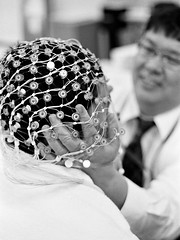Susan Greenfield, a supposedly actual scientist — somebody who really, really should know better — ignores any contrary evidence in order to push a scare about the internet destroying young people. She's the source of the idea that "The Internet is Rewiring our brains!!! (OMG! We're going to DIE!!!)".
Well, of course using the internet rewires our brains. Any experience rewires our brains — that's what brains do. When you remember something, that happens by the brain rewiring itself to add that memory. You can use the same argument for any experience: "Having sex rewires our brains!", "Having breakfast rewires our brains!", "Having fun rewires our brains!". Reading about Greeenfield certainly rewires my brain to become cranky and annoyed for hours afterwards.
She's been pretty thoroughly debunked, but lack of evidence doesn't seem to stop her in any way. She's apparently not happy with the waning press coverage however, so now she's claiming that the internet and social websites in particular is a cause of autism.
Well, of course using the internet rewires our brains. Any experience rewires our brains — that's what brains do. When you remember something, that happens by the brain rewiring itself to add that memory. You can use the same argument for any experience: "Having sex rewires our brains!", "Having breakfast rewires our brains!", "Having fun rewires our brains!". Reading about Greeenfield certainly rewires my brain to become cranky and annoyed for hours afterwards.
She's been pretty thoroughly debunked, but lack of evidence doesn't seem to stop her in any way. She's apparently not happy with the waning press coverage however, so now she's claiming that the internet and social websites in particular is a cause of autism.
Several people such as Dorothy Bishop point out some obvious problems with that idea, such that a) the rise in autism diagnosis started long before the internet became a public medium; and b) autism is typically diagnosed at the age of two, long before children start using social sites. Her answer — her full scientific argument, really — is:
"I point to the increase in autism and I point to internet use. That's all."
"That's all", and that's the problem. Carl Zimmer (read his blog; it's great) Have an excellent summary. And as he points out, some people have taken this brilliant piece of argumentative excellence and run with it on twitter. The result is pearls like:
Take-away lesson: Somebody may have a "PhD" at the end of their name — or an "MD", or a "Rev.", or "Civ. Eng.", or anything — but that doesn't guarantee they're not ignorant about what they say, or that they're not trying to push an agenda they know to be false (if they're a "Rev." that's more likely than not of course).
Sometimes an expert in one field wades in to do cocksure pronouncements in another without understanding it, and end up embarrassed. "Expert" critics of global warming, for instance, tend to be engineers or physicists without a background in climatology. Engineers and physicians seem particularly prone to this. They have a method-based hands-on understanding of one particular subfield, and think they can apply their methods to other fields without learning enough background to actually understand it.
"I point to Alzheimer's and I point to cheese doodles. That's all."
"I point to diabetes and I point to cats. That's all."
Take-away lesson: Somebody may have a "PhD" at the end of their name — or an "MD", or a "Rev.", or "Civ. Eng.", or anything — but that doesn't guarantee they're not ignorant about what they say, or that they're not trying to push an agenda they know to be false (if they're a "Rev." that's more likely than not of course).
Sometimes an expert in one field wades in to do cocksure pronouncements in another without understanding it, and end up embarrassed. "Expert" critics of global warming, for instance, tend to be engineers or physicists without a background in climatology. Engineers and physicians seem particularly prone to this. They have a method-based hands-on understanding of one particular subfield, and think they can apply their methods to other fields without learning enough background to actually understand it.
And we're all human. As much as we want scientists to be objective and disinterested, the reality is that we all have our biases and hobby-horses, and we're concerned about our own careers, our pensions and mortgages. We grow old and cranky and stop learning new things. We refuse to let go of favourite ideas long after they've been disproved. We may have religious or political biases that blinds us to some facts. Some may see fame and fortune — or at least a modest side income — from ignoring evidence and science in favour of publicity and a book deal.
I'm not arguing against expertise. An expert is a lot more knowledgeable than a non-expert and people know this — would you rather have a bypass operation done by a heart surgeon or by a plumber? But check that the expert really is an expert in that particular field; how about open heart surgery by a psychiatrist, a dermatologist or an eye surgeon? They're all MDs too after all.
Ask yourself if this person might have a bias or some reason to not be completely open and accurate. If they happen to run for office, or if they are devoutly religious they may have reason to make the science sound like what they or other people want to hear. If they're selling a book, or if they're paid by a particular interest group or company there's reason to be suspicious.
But most of all, if a claim is at all sensationalist or surprising, ask for the evidence. If they have evidence — if they have data and analysis, and if that has been corroborated by others — they should be happy to disclose it. If they show only sketchy, suspicious or discredited data, or if they show nothing at all, then that probably means they have no solid evidence. If so, ignore them. If they are right, then people will find good, solid evidence sooner or later. If not, then you won't have wasted your time, and possibly your health and your money, on a fraud.



Greenfield's theory sounds as far fetched as the one that says that "video games makes kids violent"...yeah right. As wel as you said it, usually people that attack this isuues, in my case video games, are "experts" that have never picked up a PS# controller and know squat about video games other than from reference or what they saw in a TV ina particuluar part of a game
ReplyDeleteI point to the increase in violence and I point to the stray dog passing by. That's all."
ReplyDeleteAt the same time, her main background assertion, that the internet is damaging for some children, has not been disproven either. She is scaremongering, but that does not by itself provide proof that she is wrong, merely that she is not able to prove herself right.
ReplyDeleteThe video game connection is another example. We know the connection to violence is weak; we also suspect it's likely not zero. It may well be that games are completely harmless for a majority of players, but can cause problems for a minority that are susceptible to it. Again, our own biases (we really like video games) risk blinding us to possible problems with them.